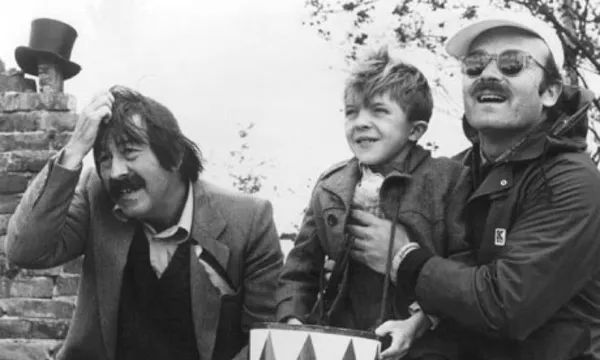 |
| Günter Grass with David Bennent and Volker Schlöndorff on the set of The Tin Drum |
Günter Grass, honored in 1999 with the Nobel Prize for Literature, died at the age of 87 today, April 13. Volker Schlöndorff directed The Tin Drum (Die Blechtrommel), based on Grass’s first novel and worked on the screenplay with Jean-Claude Carrière and Franz Seitz. Grass contributed additional dialogue. The film premiered at Cannes in 1979, winning the Palme d'Or in a tie with Francis Ford Coppola's Apocalypse Now and the Academy Award for Best Foreign Language Film in 1980. Last year in New York at Lincoln Center, Volker and I discussed his adaptations, from The Tin Drum to Arthur Miller's Death of a Salesman and Cyril Gély's play Diplomatie (Diplomacy).
 |
| Peeling the onion signed by Günter Grass - June 2007 Photo: Anne-Katrin Titze |
When Günter Grass came to New York in June 2007, I had the chance to discuss with him his love of cinema. We spoke about German films in general and Helmut Käutner in particular. Grass told me how much he liked Romanze In Moll, less because of the Guy de Maupassant story and mostly because he had a crush on the film's star, actress Marianne Hoppe. Käutner's masterpiece, Unter Den Brücken, made during the final days of the war on the waterways around Berlin, he agreed, was a kind of German variation of Jean Vigo's L'Atalante. Since it was on the occasion of the publication of his memoir, Peeling The Onion, I had brought a big white onion for Günter Grass to sign. The artifact has lived in the corner of my freezer ever since, next to a tiny piece of William Burroughs' Mugwump.
Anne-Katrin Titze - April 13, 2015
This morning, Volker sent me the following tribute in remembrance of his long-time friend Günter Grass.
(Scroll down for translation)
 |
| Angela Winkler as Agnes Matzerath with Charles Aznavour as Sigismund Markus in The Tin Drum |
"Warum tut diese Nachricht so weh? Millionen werden diesen Verlust ebenso empfinden, die "schweigenden Leser", die ihm über ein halbes Jahrhundert treu gewesen sind. Persönlich ist es zuerst wegen dem großen Herz, das er hatte, und das ich wohl auch habe. Und aus denen heraus wir uns oft über das ausgetauscht haben, worüber man sonst nicht spricht - ausser eben mit einem solchen Freund. Sein großes Herz, aus seinen Texten sprach es, seine vielen Kinder, Enkel, seine Frauen , seine Freunde kannten es, in Liebe wie im Zorn. Es gab ihm etwas Allmächtiges, sogar in seinen eigenen Augen. Für die Öffentlichkeit hatte er einen anderen Stellenwert. Da war er vor allem "anders". Anders als man sich einen Schriftsteller, einen Deutschen, vorstellt. Und deshalb wiederum stellte er alle anderen in den Schatten. Er war die Stimme, auf die man hörte, im Inland wie im Ausland. Die Stimme aus Deutschland, die die Welt aufhorchen liess bald nach dem Krieg, an dem er, rühmlich oder unrühmlich, aber teilgenommen hatte. Er wusste, wovon er sprach, wenn er schrieb. Und er ahnte auch das Echo - meistens... Die Schreibmaschine war seine Blechtrommel. Er wusste sie zu nutzen. Zum Nutzen der Leser und unseres Landes. Denn natürlich war er ein Patriot."
Volker Schlöndorff - April 13, 2015
 |
| David Bennent as Oskar in The Tin Drum |
Translation:-
Why does this news hurt so much? Millions will feel the same way about this loss, the “silent readers” who were faithful to him for half a century. Personally, the reason for me is first of all the big heart he had, something I must have too. Those hearts made us often have exchanges about things one usually doesn't talk about - only to such a friend. His big heart, it spoke from his texts, his many children, grandchildren, his wives, his friends knew it, in love and in wrath. It gave him something all-powerful, even in his own eyes. For the public he had another standing. There he was mainly “different”. Different from how one imagined a writer, a German. And that is precisely why he overshadowed all others. He was the voice one listened to, in this country and abroad. The voice from Germany that had the world prick up its ears, soon after the war which he had, honorably or dishonorably, taken part in. He knew what he was talking about when he wrote. And he had a presentiment about the echo - most of the time. The typewriter was his tin drum. He knew how to make it profitable. To profit the readers and our country. Because, naturally, he was a patriot.





















